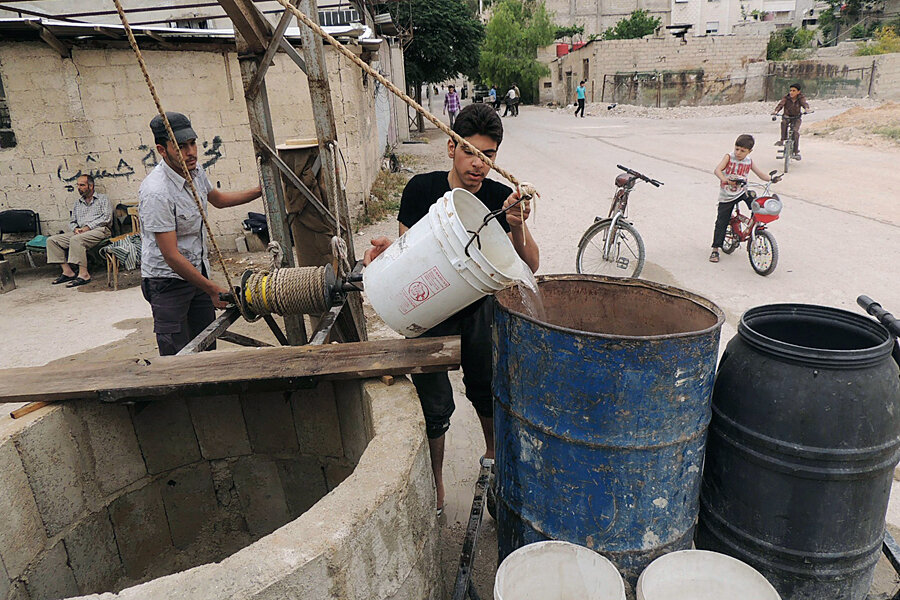Not a drop to drink: Syrian shortages feed black market for water
Loading...
| Al Tal, Syria
A version of this post appeared on Syria Deeply, a multimedia platform covering the Syrian war.
Six kilometers north of Damascus, in the city of Al Tal, a new water market is thriving. Cars and trucks mounted with generator-powered water tanks are parked alongside streets and down alleys, pulling in and out as they supply areas of the capital that are experiencing water shortages.
Last winter was Syria’s driest in years, creating widespread shortages of drinking water. Power cuts also contributed to the shortfall, with many of the large pumps needed to keep water flowing knocked out of operation by sabotage or heavy fighting.
For most civilians, the shortages have turned daily chores like cooking or bathing into an ordeal. But for others, they have given rise to a new business of water. Across the country, small-scale enterprises have popped up, providing water through generator-powered water tanks mounted on automobiles.
In Damascus, the mobile tanks have been delivering water to water stores around the city. Residents say this has doubled the price of the generator-issued water for consumers, because both the car driver and the shopkeeper need to turn a profit.
Young Syrians are increasingly taking up work in the new water industry. Some had already been working in the irrigation business, transporting water to remote areas, while others joined more recently after realizing this was a rare market niche providing a modicum of income.
Abdel Rahman Mohammad, 24, is originally from Douma and moved to Al Tal with other families who had fled the fighting in his hometown. He says that a water crisis in Al Tal was what kickstarted the idea of water trucks. For 45 days this year, residents had no access to running water. A group of residents figured out how to mount the tanks, and demand rapidly increased.
Abdel Rahman says that initially, he had worked as a runner, buying and transporting canned food, goods and furniture to various neighborhoods. However, he soon realized that delivering water was less time consuming and provided a better income. "This is a growing market," he says. "People need water to survive."
Abdel Karim, from Homs, moved to Al Tal to escape fighting and switched from transporting construction material to water. He said that his current job provides enough for rent and other living expenses. He says the water trucks have provided 200 jobs for Al Tal residents, with over 200 trucks operating at any given time.
But the water doesn't come cheap. One tank costs 1,000 Syrian pounds ($6.60). Karim says a family of four usually needs to buy eight water tanks per month to cover basic needs like cooking, drinking and bathing.
There are also health considerations. The water comes from wells at the outskirts of the city and hasn’t been properly sanitized. Most of the time, says Al Tal resident and former Health Ministry official Dr. Abdel Hamid, the truck water is contaminated and could cause a number of diseases. Sewage, he adds, often seeps into the water wells. Most buyers use filters or boil the water before using it.
Often, water is stored before delivery, sitting stagnant and turning yellow after a few days, leaving a layer of dirt at the bottom of the container.
Abou Omar, 45, a member of Al Tal's Local Civilian Council, says water shortages are expected to continue until next winter's rainfall.
Editing by Karen Leigh.







